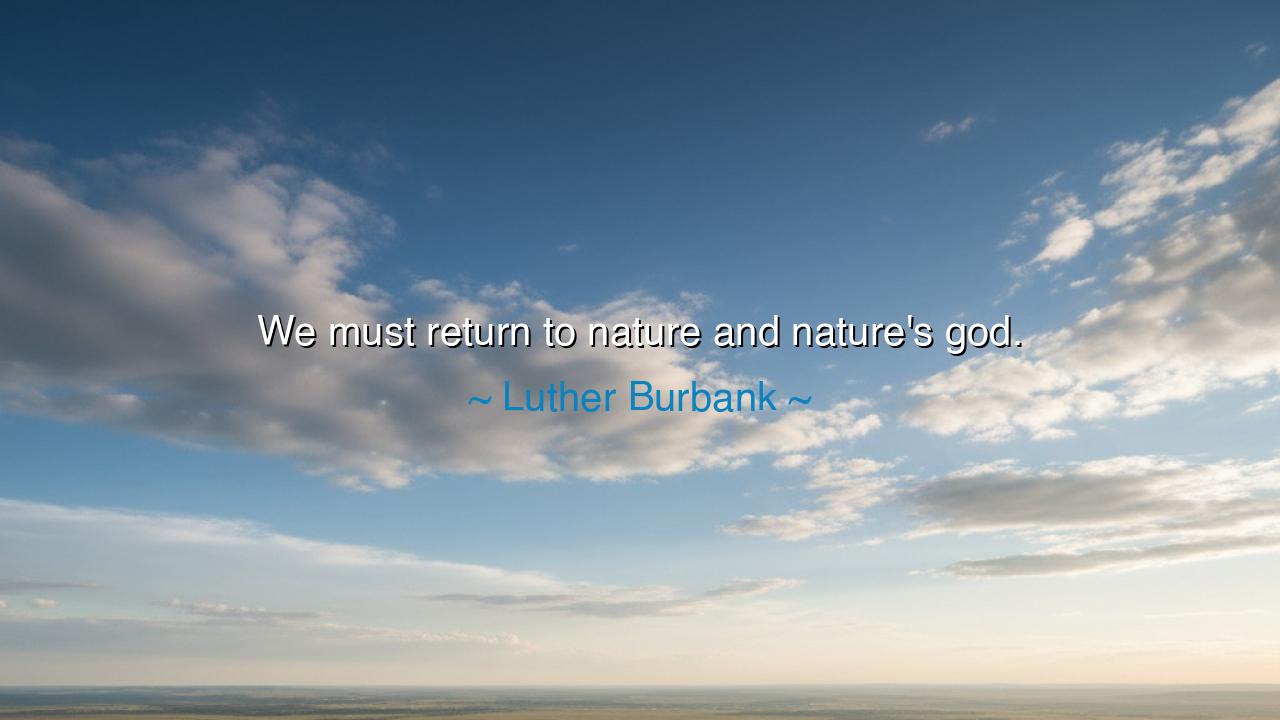
We must return to nature and nature's god.






In a voice like rain waking seed, Luther Burbank declares: “We must return to nature and nature’s God.” The sentence is short as a seed yet vast as a forest. To return is not to flee the city or deny the mind; it is to go back to the first covenant—soil to hand, breath to leaf, creature to Creator. He calls us away from the fever of cleverness without reverence, from the clangor of gain without gratitude, and back to the slow grammar by which the world was first spoken into being. In this oracle, nature is not a backdrop but a teacher; nature’s God is not a slogan but the law of love and order woven through root and river.
To return to nature is to remember the old disciplines: patience of seasons, humility before limits, joy in small abundance. The ancients tilled by the stars and prayed by the rains; they understood that life moves in circles—sprout, flower, fruit, fallow—and that wisdom moves likewise—wonder, work, harvest, rest. When we forget this, we attempt straight lines through living curves; we exhaust land and spirit alike. Burbank’s charge is gentle but relentless: align your life with the pulse of fields and forests, or live as an exile in your own home.
To return to nature’s God is to honor the principles that make life possible—cooperation amid competition, diversity as strength, reciprocity as justice. This is not a call to dogma; it is an invitation to design with the grain of reality. The river teaches flow and floodplain; the mycelium teaches exchange and hidden networks; the hive teaches labor knit to common sweetness. When craft and policy heed such parables, they prosper; when they mock them, they collapse under their own noise. Thus the sacred is not elsewhere; it is the wisdom embedded in the world, waiting to be obeyed.
Consider a lamp from Burbank’s own days. In the dry light of California, he married patience to experiment, coaxing the Russet Burbank potato, the Shasta daisy, the Santa Rosa plum from careful crosses and tireless observation. He did not bully the seed; he conversed with it. He watched how a plant spoke its needs in leaf-edge and stem, how soil answered in texture and scent. The miracles people praised were not violations of nature but collaborations with it. Burbank’s fields were chapels where learning and reverence knelt together, and the altar was a row of seedlings holding futures in their small green fists.
Lift another lamp from a different shore: George Washington Carver, who walked the worn-out fields of the South and taught farmers to rotate crops, to return nitrogen with peanuts and sweet potatoes, to press beauty from waste. He prayed in the predawn woods and listened for instruction, then returned to the lab and ledger. His gospel was the same as Burbank’s in another tongue: if you would heal people, begin by returning to nature—to the soil’s hunger, the plant’s possibility, the community’s need—and you will find nature’s God meeting you in the hinge where mercy and method join.
The meaning of the saying, then, is double and indivisible: renewal of the earth and renewal of the heart. We cannot mend rivers with a broken spirit, nor mend spirits while fouling rivers. To return is to change scale—slower food, thicker roots, nearer neighbors—and to choose forms that honor the living: materials that return to soil, cities that breathe with trees, economies that prize durability over spectacle. It is also to adopt a posture—gratitude before consumption, attention before ambition, blessing before bargain.
What, then, shall we do? Begin with practices as plain as bread. Grow one thing you can eat or share; learn the names of five trees on your street; compost your peels and your pride; keep a Sabbath for your devices and your nerves; spend money as if it were a vote for the world you want to inhabit; design your work so that someone—or something—besides you is better for it. Advocate for rivers given room to meander, farms that build soil, towns planned for feet and shade. Teach children to read the sky and the ground, that affection might anchor duty. In these small obediences, we step onto the old road. And on that road, beneath the patient constellations, we find what Burbank promised: the way home—to nature, and to nature’s God.






AAdministratorAdministrator
Welcome, honored guests. Please leave a comment, we will respond soon